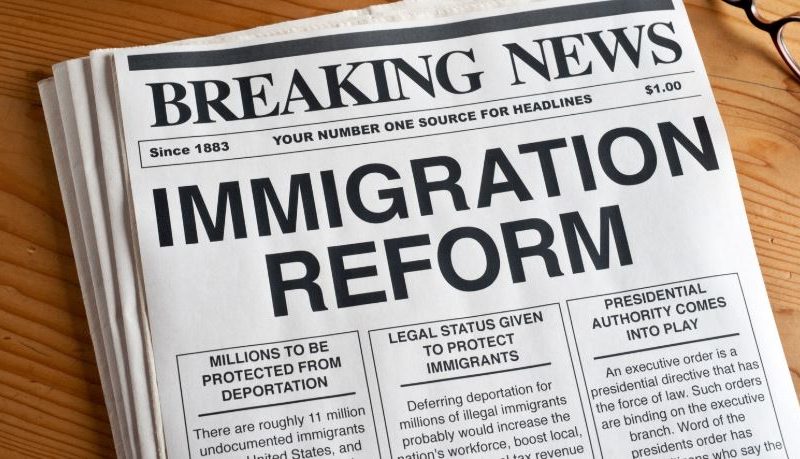The Reform Party, led by Nigel Farage, has become a powerful voice in the UK political landscape, especially concerning immigration policies.
The 2025 English local elections brought immigration back to the forefront of political discussions, with the Reform Party pushing for significant changes to current laws.
Amidst this political tension, the UK Labour Government published a White Paper outlining deeper restrictions on immigration, largely seen as a response to the Reform Party’s growing influence.
This article explores the Reform Party’s immigration policies, their evolution, and the latest updates that are shaping the future of UK immigration.
What is the Reform Party in the UK?
The Reform Party, originally known as the Brexit Party, was established by Nigel Farage and Richard Tice in 2018. Its primary purpose was to ensure the United Kingdom’s departure from the European Union.
Following the successful Brexit referendum, the party rebranded to the Reform Party in 2021, broadening its political goals to encompass national reform, economic restructuring, and stricter immigration policies.
Origins and Transformation
The Brexit Party initially gained momentum by capitalizing on public frustration with prolonged Brexit negotiations.
Its rebranding to the Reform Party marked a shift towards advocating for broader political changes, particularly in the realms of immigration and governance.
Nigel Farage remained at the helm, using his political influence to draw attention to issues like border control and economic sovereignty.
Political Vision and Focus
The Reform Party’s primary focus is on reducing bureaucracy, lowering taxes, and implementing stricter immigration controls. It argues that uncontrolled immigration places unnecessary strain on public services, housing, and local job markets.
With its emphasis on “common-sense politics,” the party seeks to prioritize the rights of UK citizens while limiting the influx of unskilled labor.
How Has the Reform Party’s Immigration Policy Changed Over Time?

Since its inception, the Reform Party’s immigration policy has evolved significantly. Initially, the party’s main focus was on Brexit, pushing for the UK to leave the European Union to regain control over its borders. After achieving its primary goal, the party shifted its focus to broader immigration reforms.
Key changes in the Reform Party’s immigration policies include:
- Cap on Essential Migration: Nigel Farage has announced plans to limit essential migration, ensuring that only necessary workers are permitted entry. This cap is designed to protect local job markets and reduce pressure on public services.
- Reduced Family Sponsorship: The party has proposed tightening the requirements for family sponsorships, making it more challenging for immigrants to bring extended family members to the UK.
- Skills-Based Migration: The party emphasizes skills-based migration, prioritizing workers with qualifications that match the UK’s economic needs.
- Increased Border Control: There is a strong push for more robust border control measures to prevent illegal immigration and streamline legal pathways.
These changes reflect the Reform Party’s broader political agenda of prioritizing national interests and reducing immigration numbers to manageable levels.
The party argues that stricter immigration controls will alleviate pressure on public services, housing, and job markets, ultimately benefiting UK citizens.
What is Reform Party UK Immigration – Latest News?
The most recent updates on the Reform Party’s immigration stance emerged during the 2025 English local elections. The party made significant gains, highlighting public support for its hardline immigration policies.
Farage’s campaign focused on reducing immigration numbers, capping essential migration, and enhancing border security.
Highlights from the 2025 Elections
The Reform Party’s performance in local elections demonstrated growing support for its policies. In several districts, the party won council seats, reflecting public concern over immigration levels. Farage used these victories to call for immediate action on border control and visa regulations.
Labour Government’s Response
In response to the Reform Party’s rise, the Labour Government published a White Paper proposing deeper restrictions on immigration. Key proposals included increasing the skill level for Skilled Worker visas, tightening English language requirements, and introducing higher salary thresholds.
These measures are seen as attempts to counter the Reform Party’s influence by addressing public concerns over immigration.
Why Did the Reform Party Propose a Cap on Essential Migration?

The Reform Party’s proposal to cap essential migration stems from its belief that unrestricted migration strains public services and undermines local job opportunities.
According to Nigel Farage, essential migration should be limited to roles that genuinely require foreign talent, while prioritizing British workers for available jobs.
Reasons for the Cap
- Protection of Local Jobs: The party argues that many local jobs are being filled by migrant workers, leaving British citizens with fewer opportunities.
- Public Service Pressure: Health services, schools, and housing are reported to be under pressure due to high immigration numbers.
- Economic Stability: Reducing the number of incoming migrants is seen as a way to stabilize the economy and manage public spending more effectively.
Farage has emphasized that while the party is not anti-immigration, it is focused on “sensible levels” that match the country’s capacity to integrate new residents effectively.
The cap is designed to reduce dependency on foreign workers while encouraging investment in local skills and training programs.
How Does the Reform Party’s Immigration Policy Compare to Conservative and Labour Stances?
The Reform Party’s immigration policy is distinct from those of the Conservative and Labour Parties, particularly in its emphasis on strict caps and limited family reunification. While all three parties advocate for controlled migration, their approaches differ significantly.
Conservative Party’s Approach
The Conservative Party has traditionally supported controlled migration with a focus on skilled workers. Its policies include tighter visa requirements and stronger border controls. However, the party remains more lenient than the Reform Party on family reunification and student visas.
Labour Party’s Perspective
Labour has generally favored more open immigration policies, emphasizing economic contributions and multiculturalism.
However, its 2025 White Paper suggests a shift towards deeper restrictions, aligning slightly more with the Reform Party’s stance. Proposals include raising skill levels for visas and tightening family sponsorship rules.
Reform Party’s Distinctive Stance
Unlike its political rivals, the Reform Party advocates for a near-zero net migration target, caps on essential workers, and stringent vetting processes.
Its policies focus heavily on economic self-reliance and public service relief, setting it apart as the strictest on immigration.
What Impact Could the Reform Party’s Immigration Policies Have on UK Border Control?

The Reform Party’s strict immigration policies are set to dramatically reshape UK border control.
Farage and his party have consistently pushed for more rigorous checks and enhanced technology at border points to limit illegal crossings and control the flow of migrants. These measures are seen as essential to ensuring national security and economic stability.
Enhanced Border Technology
One of the key proposals is the implementation of advanced border technology. This includes facial recognition systems, biometric scanning, and improved data-sharing protocols with international security agencies.
These technologies are aimed at identifying potential risks before individuals even enter the UK, significantly reducing illegal migration.
Stricter Visa Regulations
The party’s stance also includes stricter visa application processes. Applications would be heavily vetted, with a primary focus on skills, language proficiency, and economic contribution. Essential migration would be capped, and visa categories would be restructured to prioritize high-skill sectors over low-skill jobs.
Reform of Asylum Procedures
Another significant aspect is the overhaul of the asylum process. The Reform Party advocates for faster processing times and more robust checks to prevent fraudulent claims.
Farage has suggested that asylum seekers must prove genuine need through a stringent vetting process, reducing the possibility of abuse within the system.
How Are Local Communities Responding to the Reform Party’s Immigration Plans?
The reaction to the Reform Party’s immigration proposals has been mixed, with local communities expressing both support and concern.
Areas that have historically struggled with high immigration rates have shown strong backing for the party’s stricter policies.
These communities often cite concerns over housing shortages, job competition, and pressure on public services as reasons for their support.
Positive Reception in Key Regions
In regions heavily impacted by migration, such as parts of Northern England and coastal towns, the Reform Party’s policies have been well-received.
Local residents believe that reduced immigration will alleviate overcrowding and improve access to jobs and public services. The party’s promise to cap essential migration and tighten border control has been particularly popular among working-class voters.
Criticism from Advocacy Groups
However, human rights and migrant advocacy groups have criticized the policies as overly harsh and potentially damaging to community integration.
Organizations argue that the cap on essential migration could hurt key industries such as healthcare and construction, where migrant labor is crucial. Critics also claim that restricting family reunification contradicts the UK’s long-standing humanitarian commitments.
What Role Does Nigel Farage Play in Shaping Immigration Policy?

Nigel Farage, the co-founder and leader of the Reform Party, has been instrumental in shaping its immigration policies.
Known for his outspoken views on border control and national sovereignty, Farage has been a vocal critic of mass immigration since his days leading the UK Independence Party (UKIP).
His influence on UK politics is substantial, particularly regarding the country’s approach to migration and border security.
Farage’s Political Influence
Farage’s leadership style is marked by his ability to galvanize public opinion through direct, unapologetic rhetoric.
His focus on reducing immigration numbers and tightening UK borders has resonated with a significant portion of the electorate, particularly those disillusioned with traditional party politics.
His insistence on prioritizing British jobs and curbing foreign labor has made him a dominant voice in the debate over immigration reform.
Key Policy Proposals
Under his guidance, the Reform Party has proposed several key changes, including:
- Capping essential migration to prevent job displacement.
- Tightening visa regulations for non-skilled workers.
- Increasing scrutiny of student visas and family reunification applications.
Farage’s emphasis on sovereignty and local employment has driven much of the party’s policy-making, setting it apart from more mainstream political ideologies.
Could the Reform Party’s Policies Influence Future UK Immigration Laws?
The growing influence of the Reform Party is already pushing mainstream political parties to rethink their immigration policies.
The Labour Government’s recent White Paper, published on 13 May 2025, is seen as a reaction to the Reform Party’s rising popularity, particularly in local elections.
This White Paper outlines proposals for deeper immigration restrictions, aligning somewhat with the Reform Party’s agenda.
Labour’s White Paper and Its Implications
The White Paper includes significant changes:
- Raising the skill level for new Skilled Worker visas from RQF Level 3 to RQF Level 6, returning to pre-2020 standards.
- Increasing the English language requirement for workers from B1 to B2, demanding greater proficiency.
- Rebranding the Immigration Salary List to a Temporary Shortage List, which allows specific roles with worker shortages to be filled temporarily, but without family sponsorship rights.
The Labour Government’s shift towards these more restrictive measures is largely viewed as an attempt to counter the Reform Party’s influence.
Farage and his supporters have claimed this as a victory, suggesting that the mainstream parties are now forced to acknowledge public concern over immigration.
Conclusion
The Reform Party’s immigration policies mark a significant shift in the UK’s approach to border control and migrant integration.
With Nigel Farage at the forefront, the party has successfully brought immigration reform to the center of political debate, influencing even mainstream parties like Labour to adopt stricter measures.
The 2025 local elections demonstrated public support for these policies, though criticisms remain strong from advocacy groups and political rivals.
The coming months will be crucial in determining whether the Labour Government’s White Paper proposals become law and how they will affect current visa holders and prospective migrants.
FAQs
What is the main goal of the Reform Party’s immigration policy?
The primary goal is to reduce immigration numbers, prioritize local jobs, and strengthen UK border control.
How has the Labour Government responded to the Reform Party’s policies?
The Labour Government published a White Paper in May 2025 proposing deeper immigration restrictions to counter the Reform Party’s influence.
Will current visa holders be affected by the new White Paper proposals?
No, current visa holders are generally not affected as immigration law is rarely retroactive.
What changes are proposed for the Skilled Worker visa?
The skill level requirement is expected to increase from RQF Level 3 to RQF Level 6, and English proficiency from B1 to B2.
Is family reunification still possible under the new policies?
Family reunification may become more restricted, with tighter eligibility and suitability requirements.









